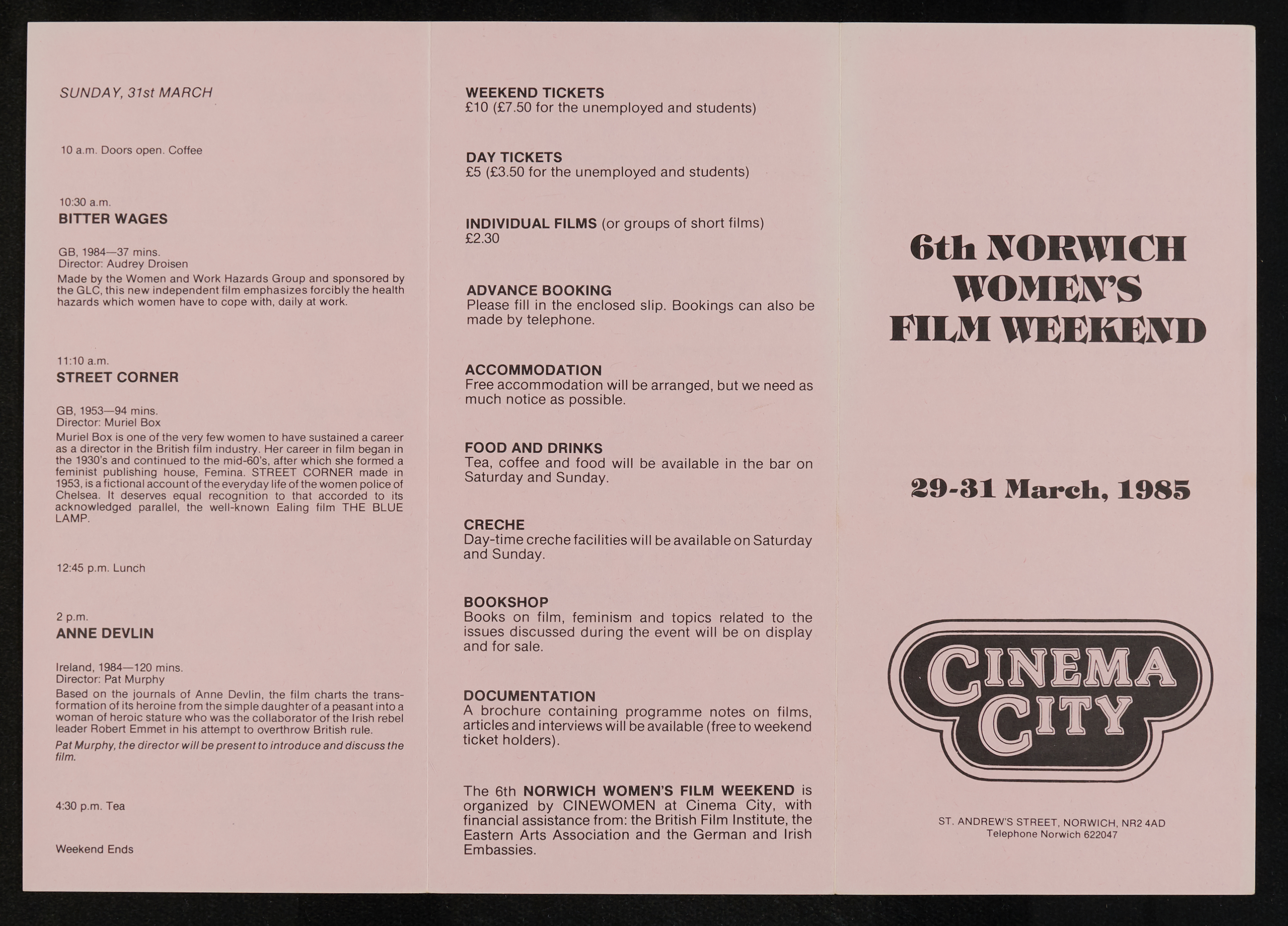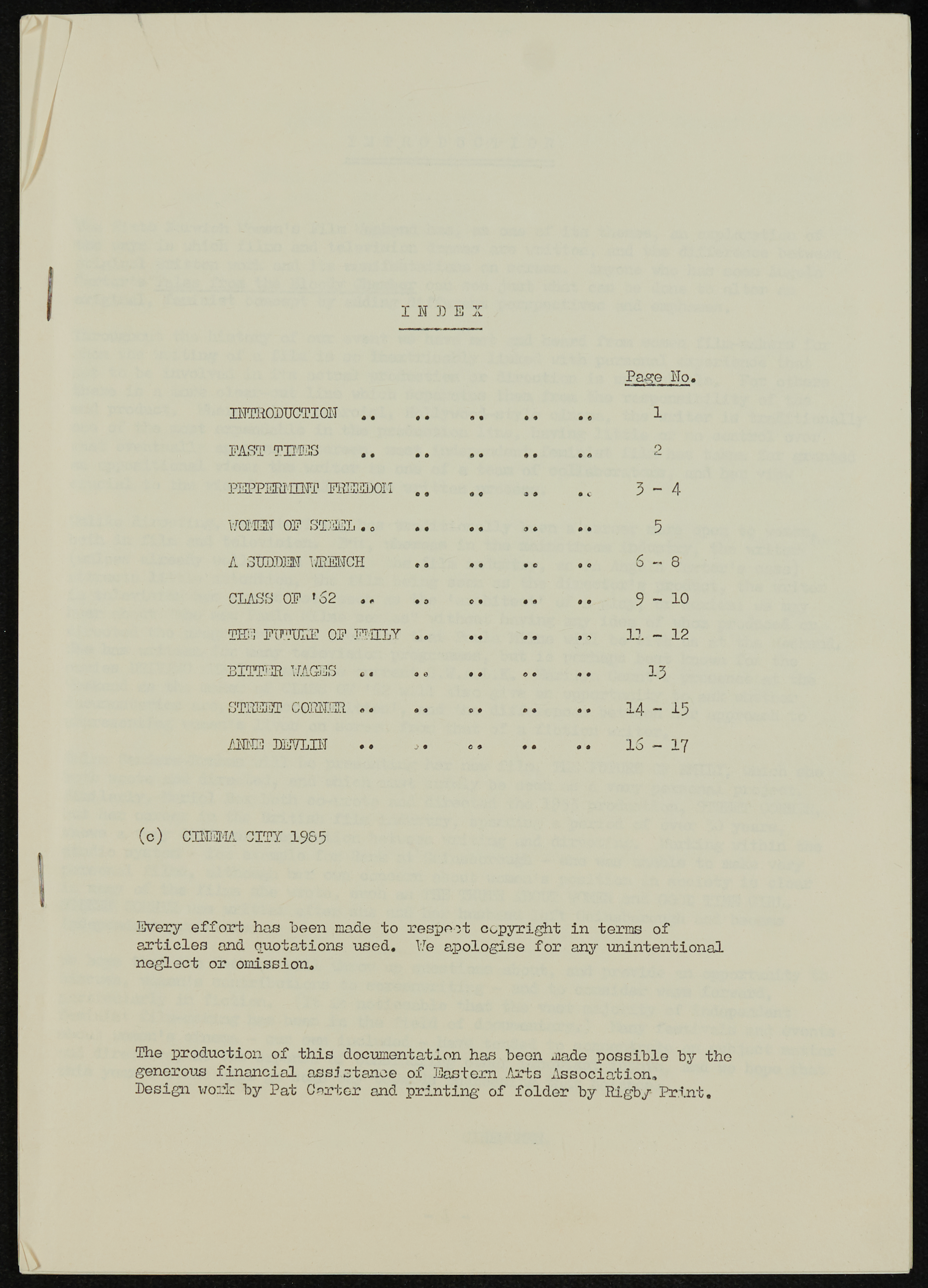


The sixth NWFW in 1985, developed two new areas of interest; looking at the contribution of scriptwriters to the film making process, and presenting work made for British television by women directors.
The Weekend commenced with a Friday late-night screening of Amy Heckerling’s Fast Times at Ridgmont High. Now regarded as a classic ‘coming of age’ film, its zany exuberance in depicting the emotional highs and lows of teenage sexuality, has had such an enduring appeal that in 2005 it was selected to be preserved in the US National Film Registry by the Library of Congress.
Having shown two of Helma Sanders-Brahms films at previous Weekends, it was a great pleasure to welcome the director to Norwich to introduce her new film The Future of Emily. Featuring three generations of mothers and daughters, the film explores the fraught dilemmas of balancing careers and family commitments. Sanders-Brahms discussed her collaboration with the two women scriptwriters, Sylvie Ponsard and Suzanne Schiffman, the latter a long-time collaborator with Truffaut. Reverberations from the Second World War cast their shadows, a theme also powerfully explored in Marianne Rosenbaum’s first feature Peppermint Freedom, in which US occupied Bavaria is conveyed through the eyes of a young girl.
We were very happy to see director Pat Murphy again (she had introduced her earlier film Maeve, in 1981). Her new film Anne Devlin was based on the prison diaries of Devlin, the housekeeper for 19th Century Irish revolutionary Robert Emmet. Murphy wrote the screenplay herself, “I wanted to tell a story that was like a ballad” and described how the diaries had an attention to detail that helped her to create a ‘painterly’ visual style for the film.
Women of Steel, made by the Sheffield Film Cooperative, is a documentary featuring women who worked in the Sheffield munitions industry during the Second World War, intercut with archive material. Audrey Doisen’s Bitter Wages looks at health hazards encountered by contemporary women in the workplace.
The working lives of women police officers in London is the fictionalised focus of Muriel Box’s 1953 film Street Corner. Women’s roles in the police in the 50s were prescribed in stereotyped ways, but Box manages to turn this to a strength with the three plot lines dramatising social issues underpinning criminality. Muriel Box (1905 – 1991) remains Britain’s most prolific female director, making thirteen feature films between 1949 and 1964 (and before that working on twenty-one films as a scriptwriter). She also founded Britain’s first feminist publisher, Femina Press. In an interview Box commented, “I think women in all their dealings…..have a raw deal from the very beginning. You can’t cite any profession where women don’t come second, that’s what I have to say as I have found it’s true.”
A woman in a very male milieu is the subject of Paula Milne’s single play for BBC television A Sudden Wrench; in which a depressed housewife and mother teaches herself to install a new central heating system in her home, and subsequently gets a job on a building site and has to prove her worth. As Milne explained to the NWFW audience, she had served her own ‘apprenticeship’ in tv on popular series and children’s drama before this, her first major directing commission. Marilyn Gaunt, who presented her Class of 62, started out in tv working as a film editor followed by a stint as Britain’s first female location sound recordist. She went on to direct many documentaries, the trilogy Class of 62 being particularly memorable. Marilyn Gaunt started filming her ex-classmates from school, all Yorkshire women born in 1946, at a re-union in 1983. The first film, documenting the lives of six friends, offers a compelling insight into the complexities, pleasures, and tribulations of ordinary lives – marriages, children, jobs, families. This was the start of a 25 year journey; she made two further films about her classmates in 1995 and 2008.
Guest speakers:
- Marilyn Gaunt – filmmaker
- Paula Milne – filmmaker
- Pat Murphy – filmmaker
- Helma Sanders-Brahms – filmmaker
Films screened:
- Fast Times at Ridgemont High, dir. Amy Heckerling (USA, 1982)
- Peppermint Freedom, dir. Marianne Rosenbaum (West Germany, 1984)
- Women of Steel, Sheffield Film Cooperative (UK, 1984)
- A Sudden Wrench (BBC TV), writer: Paula Milne (UK, 1982)
- Class of 62 (ITV), dir. Marilyn Gaunt (UK, 1984)
- The Future of Emily, dir. Helma Sanders-Brahms (West Germany, 1984)
- Bitter Wages, dir. Audrey Droisen (UK, 1984)
- Street Corner, dir. Muriel Box (UK, 1953)
- Anne Devlin, dir. Pat Murphy (Ireland, 1984)
